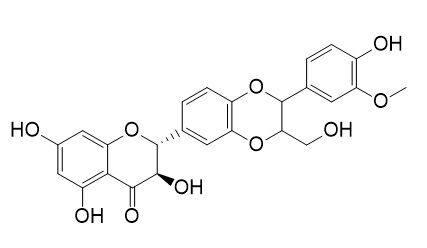Isosilybin
Isosilybin and Silybin might be suitable candidates to design potent PXR antagonists to prevent drug-drug interactions via CYP3A4 in cancer patients.

Inquire / Order:
manager@chemfaces.com
Technical Inquiries:
service@chemfaces.com
Tel:
+86-27-84237783
Fax:
+86-27-84254680
Address:
1 Building, No. 83, CheCheng Rd., Wuhan Economic and Technological Development Zone, Wuhan, Hubei 430056, PRC
Providing storage is as stated on the product vial and the vial is kept tightly sealed, the product can be stored for up to
24 months(2-8C).
Wherever possible, you should prepare and use solutions on the same day. However, if you need to make up stock solutions in advance, we recommend that you store the solution as aliquots in tightly sealed vials at -20C. Generally, these will be useable for up to two weeks. Before use, and prior to opening the vial we recommend that you allow your product to equilibrate to room temperature for at least 1 hour.
Need more advice on solubility, usage and handling? Please email to: service@chemfaces.com
The packaging of the product may have turned upside down during transportation, resulting in the natural compounds adhering to the neck or cap of the vial. take the vial out of its packaging and gently shake to let the compounds fall to the bottom of the vial. for liquid products, centrifuge at 200-500 RPM to gather the liquid at the bottom of the vial. try to avoid loss or contamination during handling.
Evid Based Complement Alternat Med.2021, 2021:5319584.
Food Chem.2018, 252:207-214
Int J Med Sci.2020, 17(5):626-631
J of Apicultural Research2020, 10.1080
J Med Food.2024, 27(8):728-739.
Mol Pharmacol.2021, 99(2):163-174.
Molecules.2019, 24(6):E1177
Molecules.2019, 24(9):E1719
Applied Physics B2021, 127(92).
Fitoterapia.2015, 100:179-86
Related and Featured Products
J Nat Prod. 2014 Apr 25;77(4):842-7.
Identification of isosilybin a from milk thistle seeds as an agonist of peroxisome proliferator-activated receptor gamma.[Pubmed:
24597776]
Peroxisome proliferator-activated receptor gamma (PPARγ) is a key regulator of glucose and lipid metabolism. Agonists of this nuclear receptor are used in the treatment of type 2 diabetes and are also studied as a potential treatment of other metabolic diseases, including nonalcoholic fatty liver disease. Silymarin, a concentrated phenolic mixture from milk thistle (Silybum marianum) seeds, is used widely as a supportive agent in the treatment of a variety of liver diseases.
METHODS AND RESULTS:
In this study, the PPARγ activation potential of silymarin and its main constituents was investigated. Isosilybin A (3) caused transactivation of a PPARγ-dependent luciferase reporter in a concentration-dependent manner. This effect could be reversed upon co-treatment with the PPARγ antagonist T0070907. In silico docking studies suggested a binding mode for 3 distinct from that of the inactive silymarin constituents, with one additional hydrogen bond to Ser342 in the entrance region of the ligand-binding domain of the receptor.
CONCLUSIONS:
Hence, Isosilybin A (3) has been identified as the first flavonolignan PPARγ agonist, suggesting its further investigation as a modulator of this nuclear receptor.
Drug Metab Dispos. 2013 Aug;41(8):1494-504.
Milk thistle's active components silybin and isosilybin: novel inhibitors of PXR-mediated CYP3A4 induction.[Pubmed:
23674609]
Because cancer is often treated with combination therapy, unexpected pharmacological effects can occur because of drug-drug interactions. Several drugs are able to cause upregulation or downregulation of drug transporters or cytochrome P450 enzymes, particularly CYP3A4. Induction of CYP3A4 may result in decreased plasma levels and therapeutic efficacy of anticancer drugs. Since the pregnane X receptor (PXR) is one of the major transcriptional regulators of CYP3A4, PXR antagonists can possibly prevent CYP3A4 induction. Currently, a limited number of PXR antagonists are available. Some of these antagonists, such as sulphoraphane and coumestrol, belong to the so-called complementary and alternative medicines (CAM).
METHODS AND RESULTS:
Therefore, the aim was to determine the potential of selected CAM (β-carotene, Echinacea purpurea, garlic, Ginkgo biloba, ginseng, grape seed, green tea, milk thistle, saw palmetto, valerian, St. John's Wort, and vitamins B6, B12, and C) to inhibit PXR-mediated CYP3A4 induction at the transcriptional level, using a reporter gene assay and a real-time polymerase chain reaction assay in LS180 colon adenocarcinoma cells. Furthermore, computational molecular docking and a LanthaScreen time-resolved fluorescence resonance energy transfer (TR-FRET) PXR competitive binding assay were performed to explore whether the inhibiting CAM components interact with PXR. The results demonstrated that milk thistle is a strong inhibitor of PXR-mediated CYP3A4 induction. The components of milk thistle responsible for this effect were identified as silybin and Isosilybin. Furthermore, computational molecular docking revealed a strong interaction between both silybin and Isosilybin and PXR, which was confirmed in the TR-FRET PXR assay.
CONCLUSIONS:
In conclusion, silybin and Isosilybin might be suitable candidates to design potent PXR antagonists to prevent drug-drug interactions via CYP3A4 in cancer patients.




